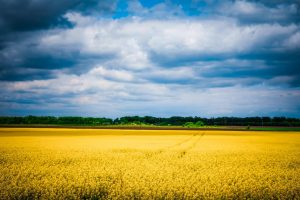
Beyond the headlines of the deadly war in Ukraine from which a large number of Jews are fleeing to Israel, lies a unique and rarely told story about the remarkable contribution of Ukrainian Jews to science, art, politics, culture and education in the history of Israel and the world.
Throughout the years, many Jews who were born and lived in Ukraine imprinted their unique world-class talents in many areas. Among the most prominent names of Ukrainian origin are Rabbi Yisrael ben Eliezer, known as the “Baal Shem Tov,” who was the father of the Hasidic movement. Some of his famous students include Rabbi Nachman of Breslav and Menachem Mendel of Kotzk. Among other names on the list of influential Ukrainian Jews are former Israeli leaders such as Golda Meir, Ze’ev Jabotinsky, Moshe Sharet, Yitzhak Ben Zvi, and Levi Eshkol.
The world of literature is also replete with spectacular landscape descriptions of the green hills of Ukraine. Nobel Prize-winning author S.Y. Agnon was inspired by his hometown Buchach. Aaron Appelfeld wrote enthusiastically about Bukovina, and Bruno Schultz about Drohobych streets.
Ukraine is beautiful. I remember traveling from north to south—from Russia to Belarus, and from Belarus through Ukraine to Odessa which lies on the Black Sea coast. There is not much difference in the transition from Russia to Belarus. Everything looks almost the same, filthy and broken. In the air it was noticeable how neglected everything around us was and that no one seemed to care much about the roadside villages. But from the moment we crossed the border and entered the territory of Ukraine, we immediately rubbed our eyes. We saw a new and clean place; even poor villages were well taken care of to preserve everything they had and to repair anything that was broken.
I remember it as a beautiful area, the climate was comfortable, the soil was fertile, everything was blooming, the conditions were relatively good and there was room to accommodate millions. Although Jews have lived in many countries in Eastern Europe, many of them were drawn to live in Ukrainian cities and villages, being pushed into the “borderline—the meaning of the word ukraina.
The Ukrainians were a very rural and land-loving people, and the locals always expected the Jews to bring development in science and medicine, in culture and the arts. At the same time, Jews experienced great antisemitism and many pogroms throughout their history in Ukraine. This pressure built within the local Jews a unique approach to life and to overcoming adversity through hard work—a kind of willpower and impulse that made them pioneers.
Even today, although we Jews have immigrated to Israel and established a national home, we still feel the stress of antisemitism pressing upon us from the global village. From every direction we are being increasingly pressured, and this is true both for Diaspora Jews and for Jews in Israel. Wherever we flee, we are always blamed for being Jews.
This pressure upon us needs to lead us to apply our willpower to a new kind of overcoming—the implementation of the correct method for forging Jewish unity to reconnect the essence of the Jewish people that we have lost in the useless quarrels between us. If we will re-acquire the knowledge and wisdom found in the connection between us, in our unity, we will then be able to give the world an unparalleled blessing, the breakthrough of lasting peace, tranquility, and fulfillment, the light humanity so desperately needs. And this gift to humanity will be the most valuable and lasting contribution of the Jewish people to the world—a true enlightenment in times of darkness.
Posted on Facebook, The Times of Israel